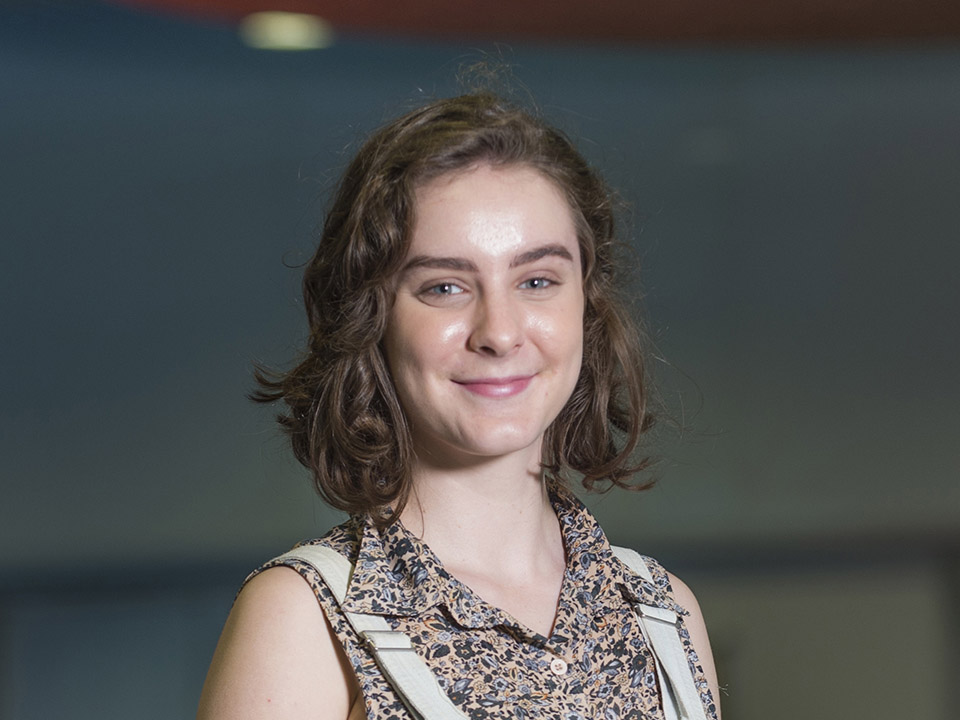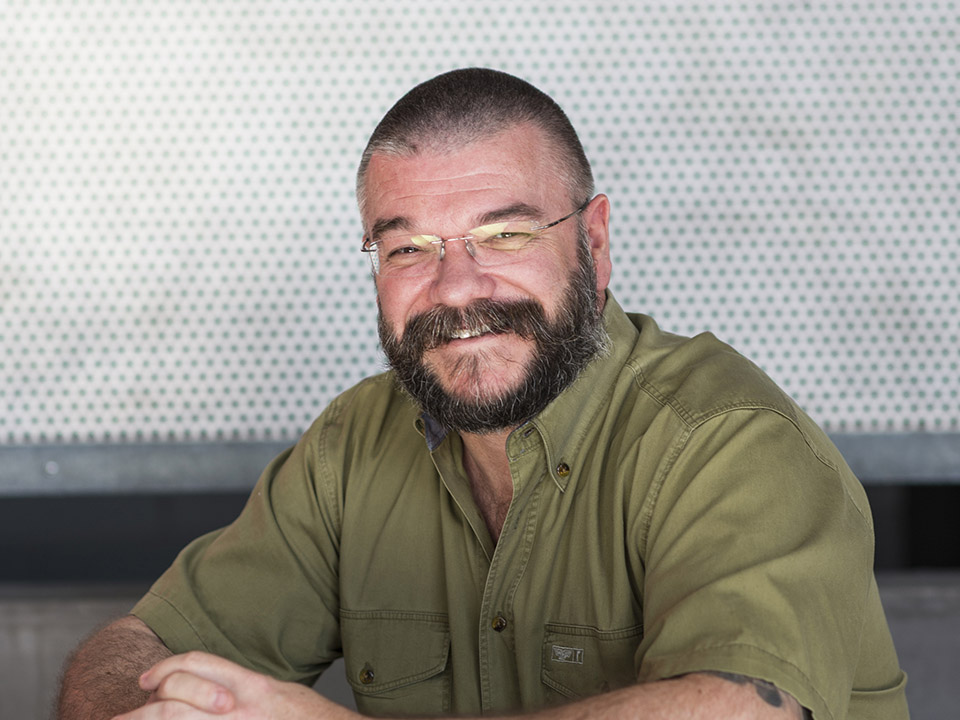What's it like studying medical laboratory science?
'Medical laboratory scientists test human and animal specimens to diagnose a disease or a mutation, or even find toxins or poisons. Some of the best moments I have had at QUT have been learning more about infectious diseases and immunity.
'Connecting the theory to the practical helped me to develop a deeper understanding of diseases and how the body works to defend the body against them.'
Providing career pathways
After deciding a career in pathology was for me, I spent a great deal of time reading job advertisements. The overwhelming majority of pathology jobs require the medical laboratory science degree. I chose QUT because their course is centred on practical and specific pathology subjects, and extremely focused on career pathways. I was impressed with the industry connections and quality of the lecturers and guest speakers. Every one of them had extensive experience and ties to the industry.
Practical placements that count
In my final year, I had a 12-week laboratory placement in an area of my preference. This was in a busy metropolitan histology laboratory, where I had the chance to rotate through all the different areas, including embedding, sectioning, special stains and immunohistochemistry. I found the experience extremely interesting and valuable, and it led to my first job in a pathology laboratory.
Experience science in 360 degrees
When you study with us, you’ll be working in real clinical settings and simulation environments from your first year. Explore our 360° environments and see what real-world health sciences can mean for you.
What's it like studying medical laboratory science?
'Medical laboratory scientists test human and animal specimens to diagnose a disease or a mutation, or even find toxins or poisons. Some of the best moments I have had at QUT have been learning more about infectious diseases and immunity.
'Connecting the theory to the practical helped me to develop a deeper understanding of diseases and how the body works to defend the body against them.'
Providing career pathways
After deciding a career in pathology was for me, I spent a great deal of time reading job advertisements. The overwhelming majority of pathology jobs require the medical laboratory science degree. I chose QUT because their course is centred on practical and specific pathology subjects, and extremely focused on career pathways. I was impressed with the industry connections and quality of the lecturers and guest speakers. Every one of them had extensive experience and ties to the industry.
Practical placements that count
In my final year, I had a 12-week laboratory placement in an area of my preference. This was in a busy metropolitan histology laboratory, where I had the chance to rotate through all the different areas, including embedding, sectioning, special stains and immunohistochemistry. I found the experience extremely interesting and valuable, and it led to my first job in a pathology laboratory.
Experience science in 360 degrees
When you study with us, you’ll be working in real clinical settings and simulation environments from your first year. Explore our 360° environments and see what real-world health sciences can mean for you.
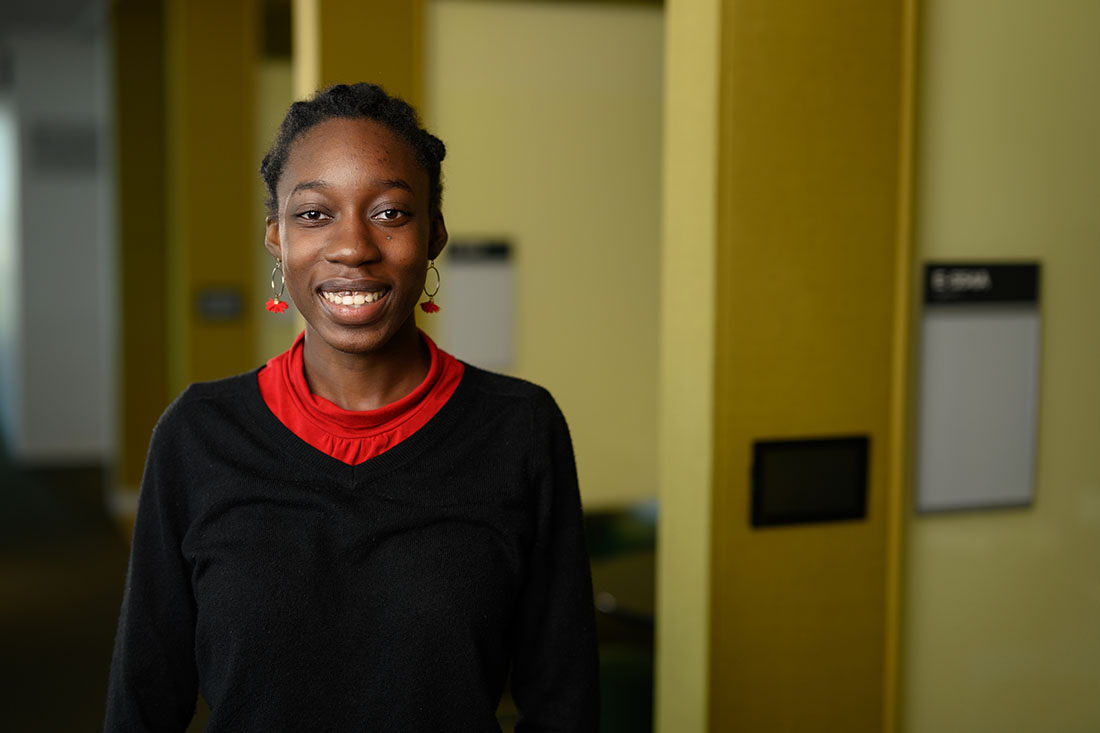
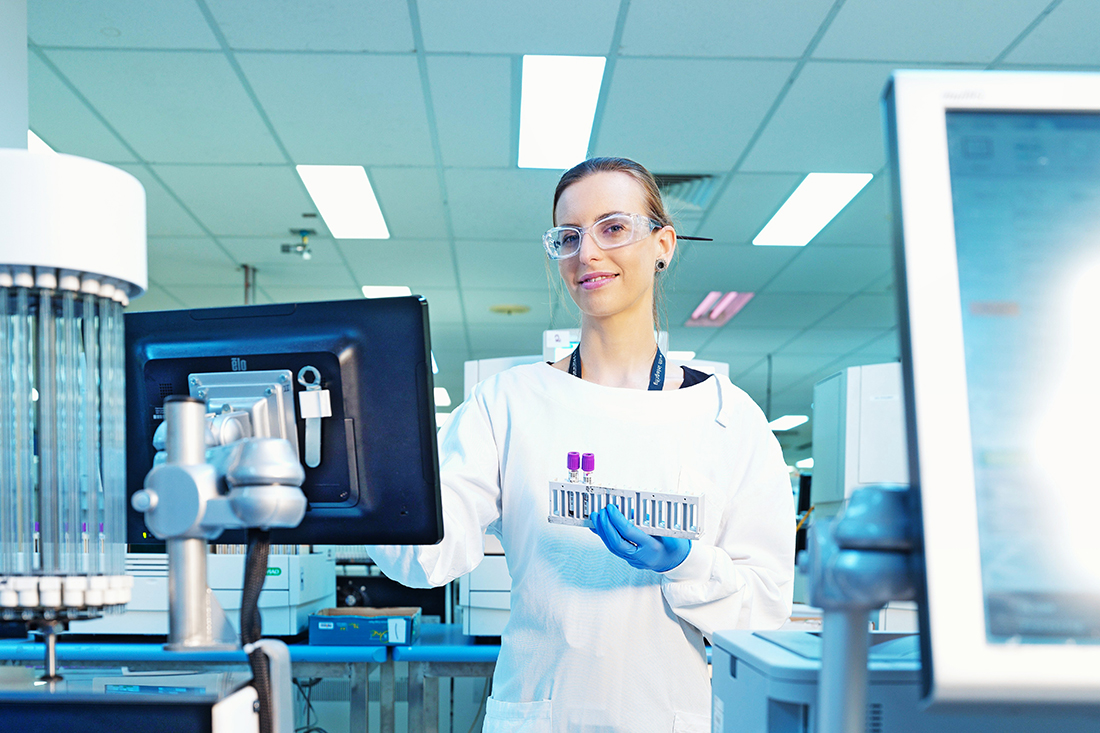

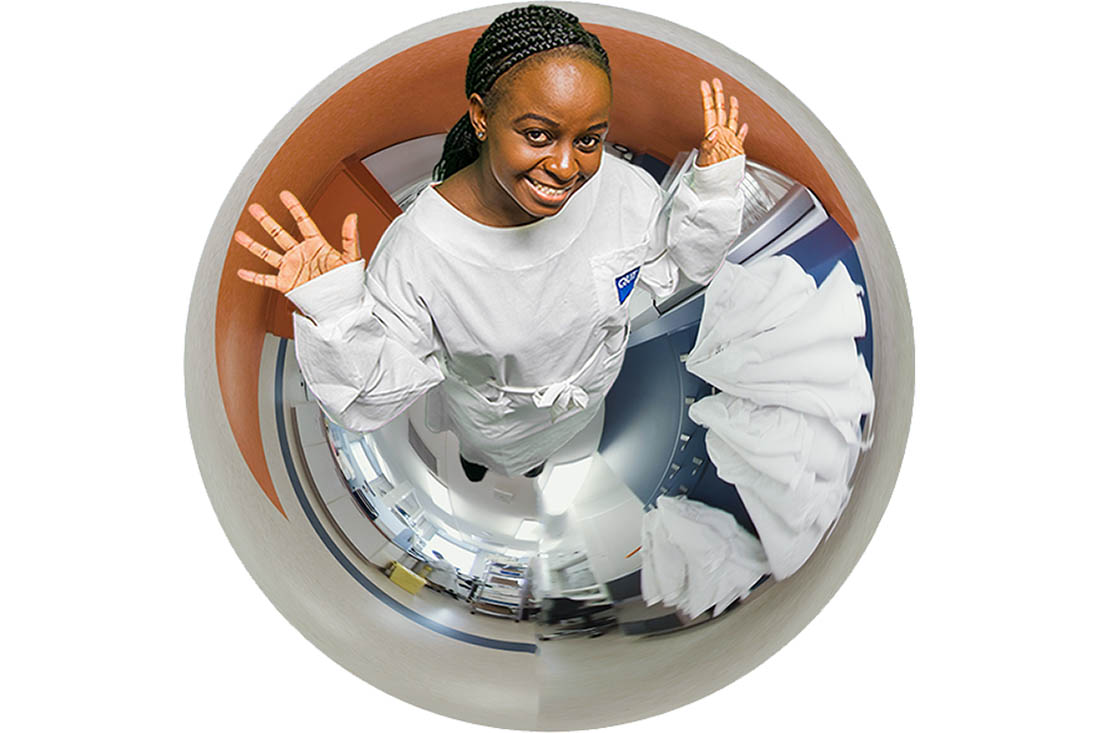




Highlights
- Explore specialised concepts in biochemistry, haematology, transfusion and transplantation science, microbiology, pathology, immunology, cytogenetic and molecular pathology, histopathological techniques, quantitative medical science, quality assurance systems, and health informatics.
- Gain practical experience in our teaching laboratories using equipment and analysers used in industry practice.
- In your final year undertake a semester-long work integrated learning internship in a recognised laboratory.
- Longest running course of its kind in South-East Queensland where graduates are eligible for membership of the Australian Institute of Medical Scientists.
Highlights
- Explore specialised concepts in biochemistry, haematology, transfusion and transplantation science, microbiology, pathology, immunology, cytogenetic and molecular pathology, histopathological techniques, quantitative medical science, quality assurance systems, and health informatics.
- Gain practical experience in our teaching laboratories using equipment and analysers used in industry practice.
- In your final year undertake a semester-long work integrated learning internship in a recognised laboratory.
- Longest running course of its kind in South-East Queensland where graduates are eligible for membership of the Australian Institute of Medical Scientists.
Why choose this course?
This degree was the first of its kind in Queensland and is taught by registered industry professionals with established careers working in pathology laboratories.
Our graduates are successful in securing positions nationally and overseas. Your studies will incorporate all areas of clinical pathology including haematology, transfusion science, cytology, biochemistry, microbiology, histology, molecular pathology and immunology, providing you with increased career opportunities.
Real-world learning
During this course, you will complete a 16-week professional placement where you will work alongside practising medical scientists and clinical researchers in accredited pathology labs and research facilities.
Hands-on experiences in the Q Block laboratories at Gardens Point and the H Block laboratories at Kelvin Grove begin during first semester of first year, and are embedded throughout the course.
We are recognised for delivering graduates who are confident with advanced techniques and able to conduct appropriate investigations to a professional standard.
Explore this course
Medical Laboratory Scientists work in clinical diagnostic pathology laboratories and perform and interpret tests on a wide range of human (and veterinary) samples such as blood, bone marrow, urine, and tissue. The results they generate are used to assess health status, diagnose disease and monitor the effects of various treatment/therapies, e.g. chemotherapy used in cancer treatments. 70% of all clinical decisions are either wholly or partially based on the results generated by pathology laboratories. In addition, 100% of cancers are diagnosed by pathology testing, as well as performing 100% of COVID-19 tests in laboratories.
The Bachelor of Medical Laboratory Science is externally accredited by the peak representative body for medical laboratory scientists in Australia, the Australian Institute for Medical and Clinical Scientists. The program contains all the relevant professional units as well as a 16-week professional placement.
Work Integrated Learning
During this course you will be required to complete 549 hours of professional work placements.
Careers and outcomes
Medical laboratory scientists work in the pathology industry, generally in hospitals or in public or private laboratories. Graduates are also employed in allied health (e.g. assisted fertility clinics) and public health laboratories.
Graduates of this course may choose a role in a multidisciplinary setting or can specialise in an area of particular interest, or complete postgraduate studies for a career in research.
Professional recognition
This course is accredited by the Australian Institute of Medical Scientists and graduates will have completed the academic and work placement requirements for admission as a full member.
Depending on your employment, you will be eligible to apply for membership of various professional organisations including the Australasian Association for Clinical Biochemistry and Laboratory Medicine, Australian Society of Microbiology, Australian Society of Cytology, Human Genetics Society of Australasia, Haematology Society of Australia and New Zealand, Australian and New Zealand Society of Blood Transfusion, and Australian Society of Thrombosis and Haemostasis.
Possible careers
- Biochemist
- Cytologist
- Hospital scientist
- Medical scientist
- Microbiologist
- Molecular diagnostics
- Pathology scientist
- Research scientist
Year 1
The course commences by developing a sound knowledge and understanding of fundamental concepts that underpin medical laboratory science: cellular and molecular biosciences, anatomy, physiology mathematics, statistics, biophysics and chemistry. You will also be introduced to the local, national and global profession of medical laboratory science, and the Australian Healthcare System in the first of your professionally orientated units in the course.
Year 2
In your second year, you will explore more specialised concepts in pathology, biochemistry, microbiology, immunology, cytogenetic and molecular pathology, histopathological techniques, quantitative medical science, and quality assurance systems. In your practical classes, you will learn some of the latest techniques used in the clinical diagnostic pathology industry, giving you the opportunity to develop your skills to professional standards.
Year 3
The third year of the program allows you to further develop and refine your knowledge, understanding and practical skills to a more advanced level, and learn how they are applied in the clinical disciplines of molecular diagnostics, microbiology, chemical pathology, diagnostic endocrinology, histopathology, cytopathology, haematology and, transfusion and transplantation science.
Year 4
In your first semester, you will undertake a semester-long work integrated learning internship in a recognised laboratory. During that time you will also complete studies in health informatics and learn how this relates to day-to-day laboratory operations. In your final semester, you will complete an elective of your choice designed to complement your learning, e.g. pharmacology, marketing, management or research techniques. You will also prepare professional plans and identify graduate opportunities, as well as further your clinical discipline specific learning in the context of intercultural health and contemporary issues in medical science.
Students complete 24 credit points of QUT You units made up of:
Core
QUT002 QUT You: Walking on Country and QUT005 QUT You: Seeing Me, Seeing You: Skills for a Diverse World and
Electives
2 x QUT You Elective Units
Year 1
The course commences by developing a sound knowledge and understanding of fundamental concepts that underpin medical laboratory science: cellular and molecular biosciences, anatomy, physiology mathematics, statistics, biophysics and chemistry. You will also be introduced to the local, national and global profession of medical laboratory science, and the Australian Healthcare System in the first of your professionally orientated units in the course.
Year 2
In your second year, you will explore more specialised concepts in pathology, biochemistry, microbiology, immunology, cytogenetic and molecular pathology, histopathological techniques, quantitative medical science, and quality assurance systems. In your practical classes, you will learn some of the latest techniques used in the clinical diagnostic pathology industry, giving you the opportunity to develop your skills to professional standards.
Year 3
The third year of the program allows you to further develop and refine your knowledge, understanding and practical skills to a more advanced level, and learn how they are applied in the clinical disciplines of molecular diagnostics, microbiology, chemical pathology, diagnostic endocrinology, histopathology, cytopathology, haematology and, transfusion and transplantation science.
Year 4
In your first semester, you will undertake a semester-long work integrated learning internship in a recognised laboratory. During that time you will also complete studies in health informatics and learn how this relates to day-to-day laboratory operations. In your final semester, you will complete an elective of your choice designed to complement your learning, e.g. pharmacology, marketing, management or research techniques. You will also prepare professional plans and identify graduate opportunities, as well as further your clinical discipline specific learning in the context of intercultural health and contemporary issues in medical science.
Students complete 24 credit points of QUT You units made up of:
Core
QUT002 QUT You: Walking on Country and QUT005 QUT You: Seeing Me, Seeing You: Skills for a Diverse World and
Electives
2 x QUT You Elective Units
- ATAR/selection rank threshold
- 72.00
These thresholds are the lowest adjusted scores to which QUT made an offer in Semester 1, 2025.
Don't have a ATAR/selection rank?
- Course code
- LS47
- QTAC code
- 418201
- CRICOS code
- 076173F
-
- Gardens Point
-
- Gardens Point
- 4 years full-time
- 8 years part-time
- 4 years full-time
- February
- February
Assumed knowledge
Before you start this course, we assume you have sound knowledge of the subject/s listed below. If you don't have the subject knowledge, you can still apply for the course but we strongly encourage you to undertake bridging studies to gain the knowledge:
- Chemistry (Units 3 & 4, C)
- English, or Literature, or English and Literature Extension, or English as an Additional Language (Units 3 & 4, C)
- Mathematical Methods, or Specialist Mathematics (Units 3 & 4, C)
Year 12 early offer scheme
If you’re a current Queensland Year 12 student, you may be eligible to receive an offer for this course on the last day of Queensland Year 12, before receiving your ATAR or selection rank.
Offer guarantee
If you achieve an ATAR or selection rank of 72.00 or higher (including any adjustments) and satisfy all other admission requirements, you are guaranteed an offer for this course.
VET guarantee
If you have completed an AQF certificate IV, diploma or higher, and satisfy all other admission requirements, you are guaranteed an offer for this course.
Advanced standing
If you have prior studies or work experience, you may be eligible for advanced standing (credit). You can apply for advanced standing once you've been accepted to QUT. If you're in your first semester of study, you must apply for advanced standing within 10 days of receiving your offer.
Deferment
You can defer your offer and postpone the start of your course for one year.
More about deferring your offer
Adjustments to your ATAR/selection rank
Any adjustments you receive to your ATAR or selection rank will be applied to this course.
Find out if you’re eligible for an adjustment to your ATAR or selection rank
Offers we made to school leavers in Semester 1, 2024
The figures listed in the tables below reflect the offers that were made to recent ATAR students. The entry thresholds box at the top of this page shows the lowest adjusted ATAR/selection rank required to receive an offer for all applicants for the most recent January QTAC offer round.
| Excluding adjustments | Including adjustments | |
|---|---|---|
| Highest ATAR/selection rank to receive an offer |
Selection rank
98.25
|
Selection rank
99.95
|
| Median ATAR/selection rank to receive an offer |
Selection rank
86.05
|
Selection rank
87.00
|
| Lowest ATAR/selection rank to receive an offer |
Selection rank
70.00
|
Selection rank
73.55
|
You can find out more about your fellow students’ backgrounds with this course’s student profile.
Other admission options
If you are of Aboriginal or Torres Strait Islander descent, you may be eligible for admission through our Centralised Assessment Selection Process (CASP).
I completed my studies outside of Australia
Select the country where you completed your studies to see a guide to the grades you need to apply for this course.
If your country or qualification is not listed, you can still apply for this course and we will assess your eligibility.
Assumed knowledge
- Chemistry (Units 3 & 4, C)
- Mathematical Methods, or Specialist Mathematics (Units 3 & 4, C)
You must have achieved this study at a level comparable to Australian Year 12 or in recognised post-secondary studies.
I completed secondary school in Australia
Assumed knowledge
Before you start this course we assume you have sound knowledge in these areas:
- Chemistry (Units 3 & 4, C)
- Mathematical Methods, or Specialist Mathematics (Units 3 & 4, C)
- ATAR/selection rank
- 72.00
Offer guarantee
If you completed secondary school in Australia and achieve an ATAR/selection rank of 72.00 or higher (including any adjustments) and satisfy all other admission requirements, you are guaranteed an offer for this course.
VET guarantee
If you have completed an AQF certificate IV, diploma or higher, and satisfy all other admission requirements, you are guaranteed an offer for this course.
Minimum English language requirements
Select the country where you completed your studies to see a guide on meeting QUT’s English language requirements.
Your scores and prior qualifications in English-speaking countries are considered. Approved English-speaking countries are Australia, Canada, England, Ireland, New Zealand, Scotland, United States of America and Wales.
If your country or qualification is not listed, you can still apply for this course and we will assess your eligibility.
We accept English language proficiency scores from the following tests undertaken in a secure test centre. Tests must be taken no more than 2 years prior to the QUT course commencement.
| English Test | Overall | Listening | Reading | Writing | Speaking |
|---|---|---|---|---|---|
| IELTS Academic / One Skill Retake | 6.5 | 6 | 6 | 6 | 6 |
|
Cambridge English Score
You must share your results with QUT through the Candidate Results Online website. |
176 | 169 | 169 | 169 | 169 |
| PTE Academic | 58 | 50 | 50 | 50 | 50 |
| TOEFL iBT | 79 | 16 | 16 | 21 | 18 |
Don't have the English language score you need? We can help!
We offer English language programs to improve your English and help you gain entry to this course.
When you apply for this course, we will recommend which English course you should enrol in.
Course requirements
There are requirements that you will need to meet as a student in this course. You will need to identify these requirements and ensure you allow sufficient time to meet them. Some of these requirements have associated costs.
Blue card: You must undergo a criminal history check for working with children and be issued with a suitability card (blue card) before commencing clinical placement/practicum in an organisation where you may work with children or young people.
The processing of your application may take several months so you must submit your blue card application to HiQ as early as possible to ensure you have your card before you begin any unit that requires contact with children. There is no charge for student blue cards. Students who already have a blue card must register it with QUT.
Information is available from the Additional course requirements and costs website.
Your actual fees may vary depending on which units you choose. We review fees annually, and they may be subject to increases.
2025 fees
2025: CSP $9,400 per year full-time (96 credit points)
Additional Costs
There are requirements that you will need to meet as a student in this course. Some of these requirements have associated costs. Information is available from the Additional course requirements and costs website.
2025 fees
2025: $52,200 per year full-time (96 credit points)
Additional Costs
There are requirements that you will need to meet as a student in this course. Some of these requirements have associated costs. Information is available from the Additional course requirements and costs website.
2024 fees
2024: CSP $9,000 per year full-time (96 credit points)
Additional Costs
There are requirements that you will need to meet as a student in this course. Some of these requirements have associated costs. Information is available from the Additional course requirements and costs website.
2024 fees
2024: $48,500 per year full-time (96 credit points)
Additional Costs
There are requirements that you will need to meet as a student in this course. Some of these requirements have associated costs. Information is available from the Additional course requirements and costs website.
Student services and amenities fees
You may need to pay student services and amenities (SA) fees as part of your course costs.
HECS-HELP: loans to help you pay for your course fees
You may not have to pay anything upfront if you're eligible for a HECS-HELP loan.
You can apply for scholarships to help you with study and living costs.
QUT Excellence Scholarship (Academic)
QUT's premier offering for students with outstanding academic achievement.
- Scholarship eligibility
- Academic performance
QUT Elite Sport Scholarship
QUT's premier offering for students with outstanding sporting achievement.
- Scholarship eligibility
- Sporting excellence
Equity scholarships scheme
A scholarship for low-income students studying in any faculty.
- Scholarship eligibility
- Struggling financially
International Merit Scholarship
A high achievement scholarship for future international undergraduate and postgraduate students.
- Scholarship eligibility
- Academic performance
Keep up to date
QUT courses for you
Like to save your courses?
Please enter your first name and email so we can save your courses for you
